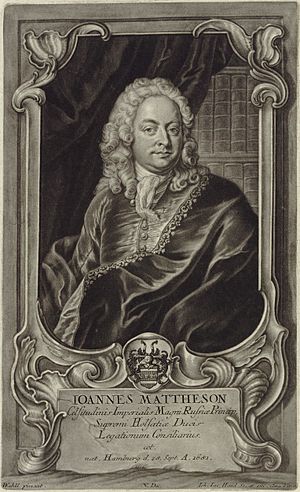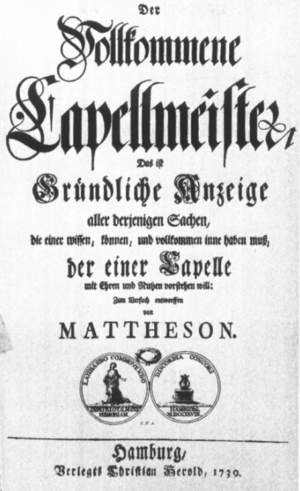Johann Mattheson facts for kids
Quick facts for kids
Johann Mattheson
|
|
|---|---|

Johann Mattheson
|
|
| Born | 28 September 1681 |
| Died | 17 April 1764 (aged 82) Hamburg
|
| Occupation | German composer and theorist |
Johann Mattheson (born September 28, 1681 – died April 17, 1764) was a talented German musician and writer. He was a composer, singer, and also worked as a diplomat. He wrote many important books about music theory.
Contents
Early Life and Musical Beginnings
Johann Mattheson grew up in Hamburg, Germany. He had a good education and learned many things. He took music lessons, including how to play keyboard instruments and the violin. He also learned to compose music and sing.
By the age of nine, he was already singing and playing the organ in church. He was also part of the chorus at the Hamburg opera house. In 1696, he made his first solo performance at the opera. He sang female roles at first. After his voice changed, he became a tenor singer. He also started conducting rehearsals and writing his own operas. From 1718, he worked as a church music director (cantor) at St. Mary's Cathedral, Hamburg. He retired from this job in 1728 because he started losing his hearing.
A Career in Diplomacy
Besides music, Mattheson had another important job. From 1706, he worked as a diplomat. He had studied English in school and spoke it very well. He became a teacher for the son of the English ambassador, Sir John Wich. Later, he became the ambassador's secretary. He even traveled on diplomatic missions to other countries. In 1709, he married Catharina Jennings, whose father was an English clergyman. They did not have any children.
Friendship with Handel
Mattheson was a close friend of another famous composer, George Frideric Handel. However, they once had a serious argument. During a performance of Mattheson's opera Die unglückselige Kleopatra, Königin von Ägypten in 1704, they had a sudden fight. Mattheson's sword almost hit Handel, but a large button on Handel's coat saved him.
Luckily, they quickly made up after this incident. They remained friends and wrote letters to each other throughout their lives. After Handel passed away, Mattheson translated a book about Handel's life into German. He paid to have it published in Hamburg in 1761.
His Musical and Literary Works
Johann Mattheson is most famous today for his writings on music theory. He wrote more than anyone else in the German Baroque period about how to perform music, how to create theatrical music, and how harmony works.
He was especially important for explaining how rhetoric (the art of speaking or writing effectively) relates to music. He wrote about this in books like Das neu-eröffnete Orchestre and Der vollkommene Capellmeister. His books are still studied today.
Most of Mattheson's own musical compositions were vocal pieces. These included eight operas and many oratorios and cantatas. He also wrote some sonatas and keyboard music. Some of his keyboard pieces were even meant to teach people how to play.
Sadly, most of his music was lost after World War II. But in 1998, many of his missing works were returned to Hamburg from Yerevan, Armenia. This included four operas and most of his oratorios. These valuable original music sheets are now kept at the Staats- und Universitätsbibliothek Hamburg.
Selected Works
Operas
- Die unglückselige Kleopatra, Königin von Ägypten (1704)
- Boris Goudenow (1710)
Oratorios
- "Das größte Kind", Christmas Oratorio
- "Die heilsame Geburt", Christmas Oratorio
- Joseph, Oratorio, 1727
- Der liebreiche und geduldige David
Death
Johann Mattheson passed away in 1764. He was buried in a special vault at St. Michaelis' Church in Hamburg. You can still visit his grave there today.
See also
 In Spanish: Johann Mattheson para niños
In Spanish: Johann Mattheson para niños
- Doctrine of the affections
- Letters and writings of George Frideric Handel
 | Lonnie Johnson |
 | Granville Woods |
 | Lewis Howard Latimer |
 | James West |


